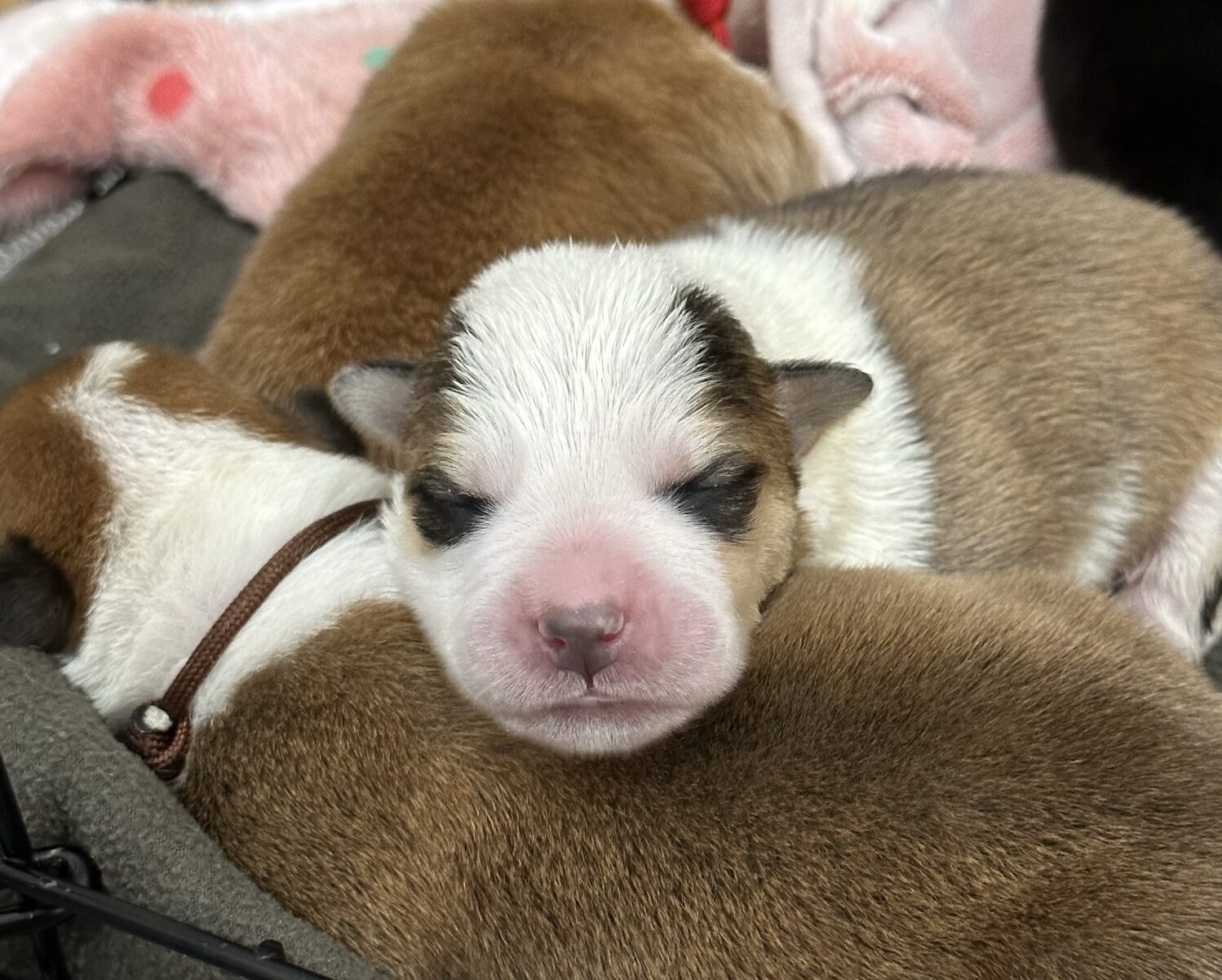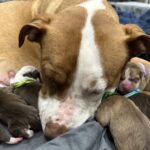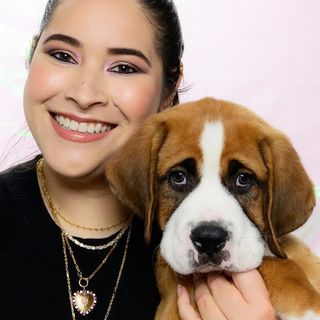The most common issues (but not typically life-threatening) that pop up when caring for bottle baby puppies include: suckling/urine scalding, crying excessively, bloating, diarrhea, and constipation. These issues tend to be related to being under- or over-fed, the equipment, and the milk replacement formula.
Suckling and Urine Scalding in Newborn Puppies
When bottle babies have a tendency to suckle on each other, this can result in them peeing on each other and themselves, which can lead to burns on their legs and paws. It can also make the area more moist and prone to infection due to being more inviting place for bacteria to thrive or because of the burning.
First, ensure that they’re being fed frequently enough and not waking up too often on their own, which is when they are most likely to squirm around and look for something to suckle on. If you find that your pup is waking up before you go to feed them consistently, it is a sign that they’re not getting enough formula per feeding or that you need to feed more frequently.
You can discourage suckling on each other by putting an oversized stuffed animal between your pups. It will give them something else to suckle on and make it a little harder to get to the other pup(s) in the crate.
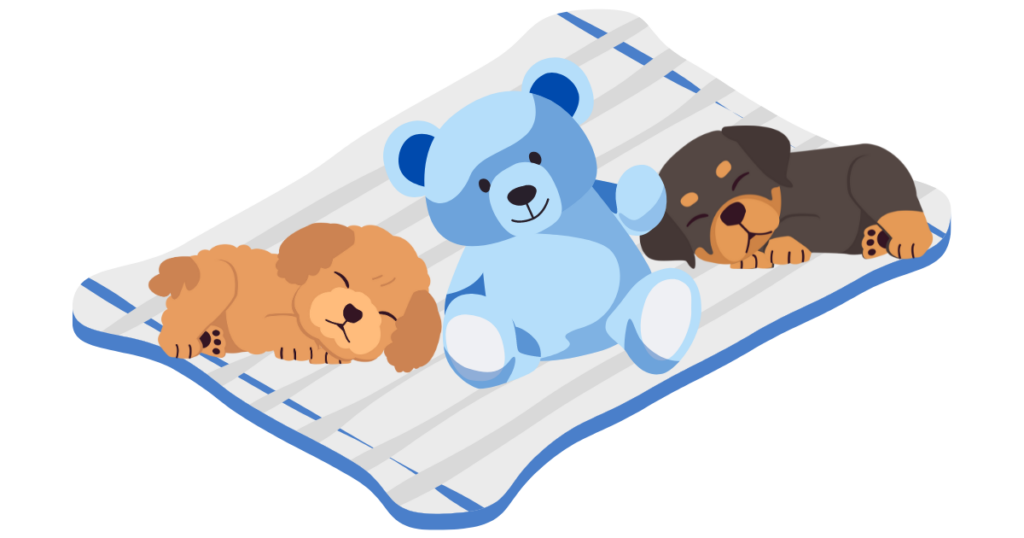
If you’re still having issues, you can consider taking an old sock and cutting the toe area off, and then cutting holes for the pup’s arms and legs. It may help minimize the suckling from its littermate but may help absorb before the urine has a chance to drip down their legs. You will need to keep an eye on these makeshift t-shirts, though, as they will need to be changed frequently and washed regularly.
Some pups will happily suckle on a (human) baby pacifier. It is also something you can hold and let a pup suckle on after they’ve fed to give them the comfort of suckling for longer.
As a last resort, the pups may need to be physically separated if it cannot be minimized and is causing damage. You might be able to still keep them in the same crate but create a barrier by using a wire rack, piece of cardboard, etc.
If there has been urine scalding, the area will appear irritated, red, flaky, or even a bit broken. It is more important than ever to keep the area dry and clean as much as possible. To help soothe the area, you can apply a zinc-free diaper ointment (A&D has one that is often used), but you may want to consult with a veterinarian before starting, in case they want to use a different topical or start antibiotics.
Crying Excessively in Newborn Puppies
Shriller, high-pitched cries may indicate pain, especially if cries are elicited by touch, which may require medical attention (see When to Be Concerned). Other cries typically indicate pup is hungry, cold, or needs to potty.
First, you can reconsider whether the feeding schedule is appropriate for the pups in your care. If they wake up and cry within an hour of a scheduled feeding consistently, they likely need to be fed more frequently or are being underfed during feedings.
Then, you can check the heat source to ensure that it is on, accessible, and warm enough to maintain the proper ambient temperature in the crate.
Finally, you can see if they need to poop or pee; they typically stimulate themselves easily enough to pee and will pee each time you stimulate them, so if they are crying for this reason, it is usually because they need to poop.
Bloating in Newborn Puppies
If the pup’s belly feels unusually tight, as if it is full of air, it may be bloated.1 This can make a pup feel uncomfortable, just like it does in humans! Bloating in bottle babies can occur when pups are overfed, eat too quickly, or the milk replacement formula doesn’t agree with their stomach.2 If puppies tend to cry after being fed, it may be worth changing the formula.3
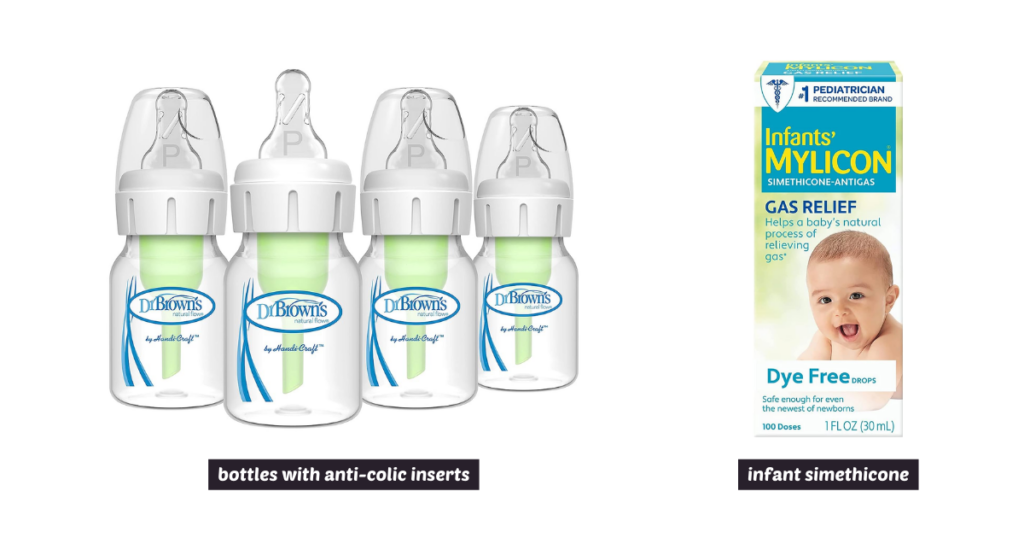
To help prevent ingesting air and help to minimize gas, use baby bottles with anti-colic inserts. You should always gently tap the puppy’s neck/back with two fingers after feeding it to try to burp it.4 You can also try to resolve built-up gas by adding simethicone (also known as Gas-X) to the formula; you will need to look for infant simethicone, which comes in a liquid format.5
The pups may also have intestinal parasites. Depending on your organization’s deworming protocol, it may be appropriate to deworm them; it is typical to deworm every two weeks starting at 2-weeks of age, but some organizations will deworm at 1-week of age if necessary.6
Diarrhea in Newborn Puppies
Ideally, newborn puppies should have slightly soft, brownish to yellowish stools, but they should not be runny, liquid, or foamy. The latter is often a consequence of over-feeding, so your first step would be to verify whether you’re feeding more than the appropriate amount per feeding. You can also add 10% water to the formula to help replace lost hydration. Keep an eye out on your pup’s hydration, which is a consequence of diarrhea.
You can also add probiotics to the puppy’s formula, if the formula does not already contain them–many commercial milk replacers do.
As a final measure, make sure that you’re thoroughly cleaning bottles and nipples after each feeding in hot water and soap.
Constipation in Newborn Puppies
Bottle babies can also experience constipation when being bottle-fed. You will want to add 25% more water to their formula until the constipation resolves, and then you can continue with an extra 10% water until they’ve transitioned to wet food and are no longer consuming formula.7
If your shelter or foster-based rescue would like a summarized handout to distribute, please find it here:
Footnotes
- Orphaned Puppies. (n.d.-b). Maddie’s Fund. https://www.maddiesfund.org/orphaned-puppies.htm ↩︎
- Feeding Orphaned Puppies | VCA Animal Hospital | VCA Animal Hospitals. (n.d.-b). Vca. https://vcahospitals.com/know-your-pet/feeding-orphaned-puppies ↩︎
- Avoid Bottle Feeding Issues in Kittens and Puppies. (2023b, February 17). Revival Animal Health. https://www.revivalanimal.com/learning-center/avoid-bottle-feeding-issues-in-kittens-and-puppies ↩︎
- Avoid Bottle Feeding Issues in Kittens and Puppies. (2023b, February 17). Revival Animal Health. https://www.revivalanimal.com/learning-center/avoid-bottle-feeding-issues-in-kittens-and-puppies ↩︎
- Admin. (2018, October 23). Management and care of neonatal dogs and cats. VetBloom blog. http://blog.vetbloom.com/theriogenology/management-care-neonatal-dogs-cats/ ↩︎
- Kitten & Puppy Deworming Schedule | Revival Animal Health. (2022, September 28). Revival Animal Health. https://www.revivalanimal.com/learning-center/kitten-puppy-deworming-schedule-revival-animal-health ↩︎
- Avoid Bottle Feeding Issues in Kittens and Puppies. (2023b, February 17). Revival Animal Health. https://www.revivalanimal.com/learning-center/avoid-bottle-feeding-issues-in-kittens-and-puppies ↩︎

